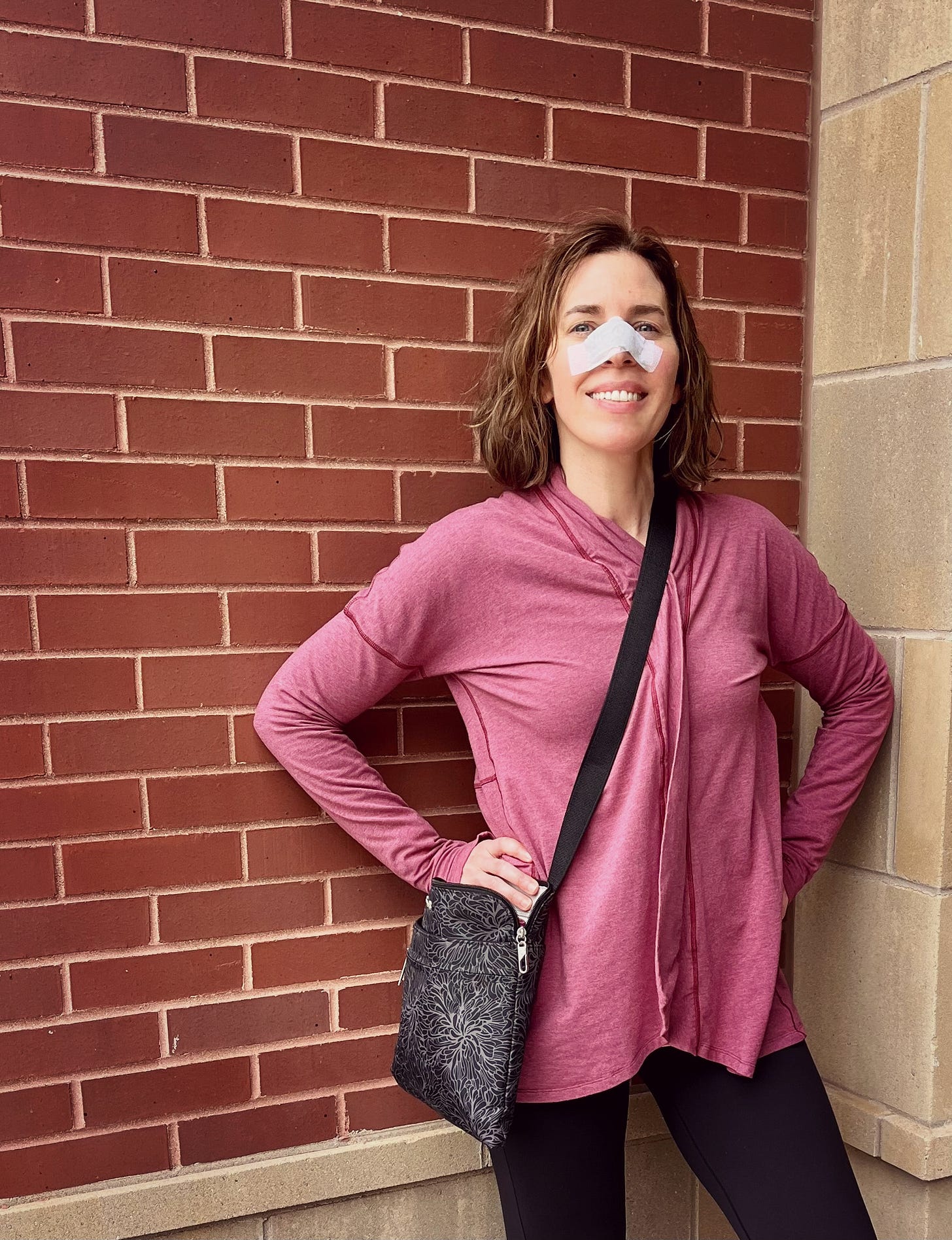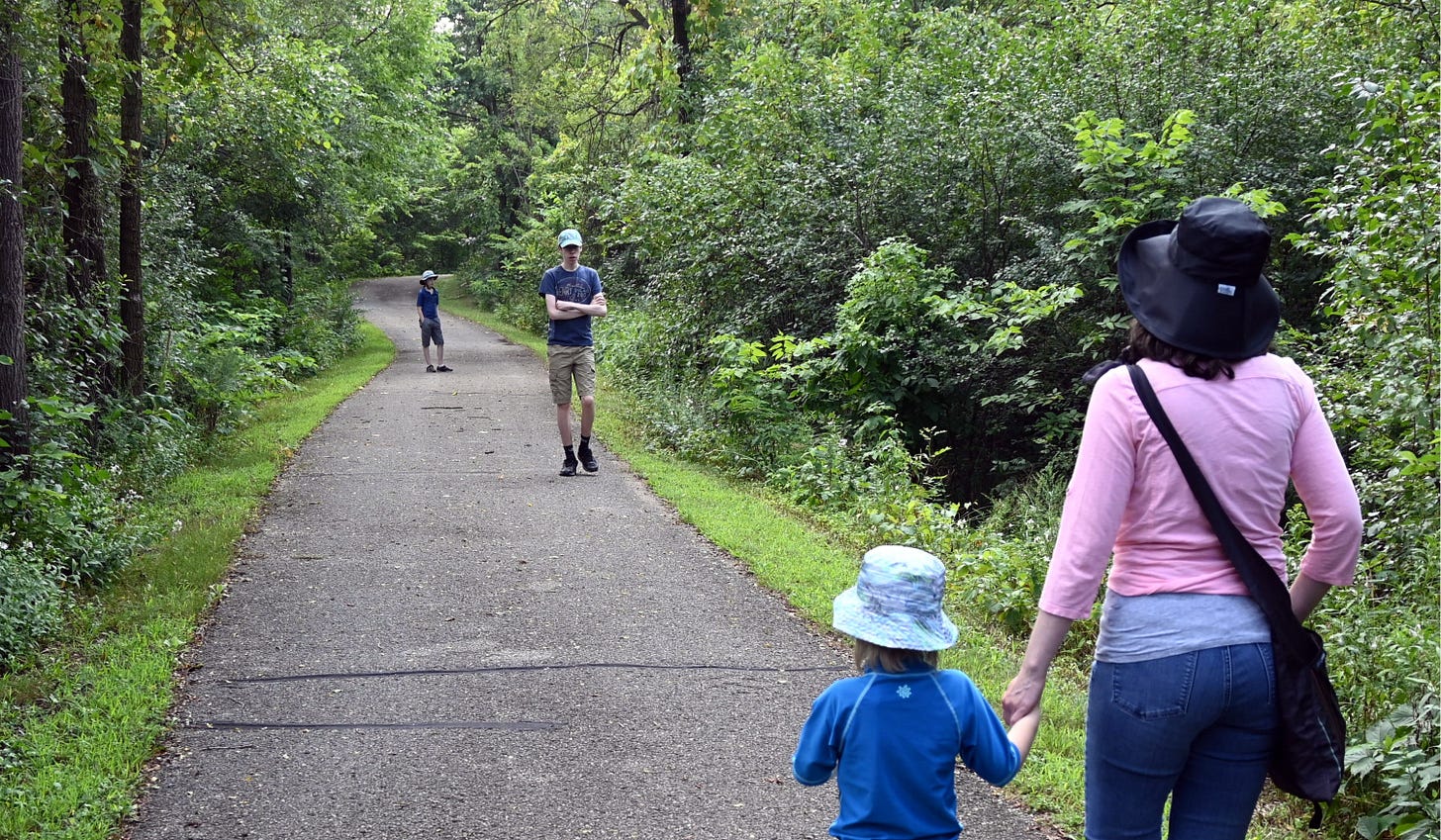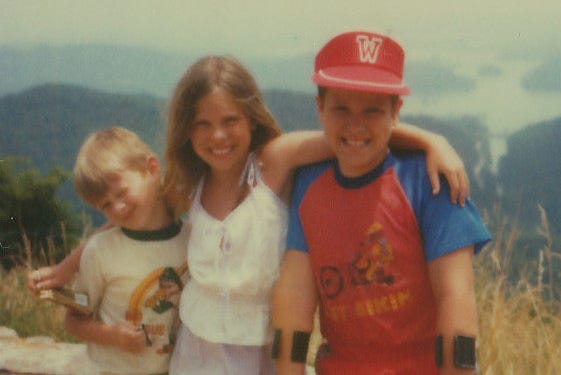Writing my way forward
I started writing after a panic attack, and I'm not stopping. Plus, thoughts on healthcare anxiety and slowing down the discussion at the doctor's office.
As I untangled each strand of story, my feelings and relationships became more manageable, and I stopped bringing my stories into ones that weren’t mine.
Since I had a panic attack at the doctor's office five years ago, I’ve healed more than I ever thought possible. Lots of things helped: a supportive spouse, talk therapy, and pockets of empty time (which I only found when I felt like I had no choice). But what surprised me the most is how much writing and sharing my stories has helped, way more than I ever expected.
Around the time I started writing, I read
’s High Conflict book. It’s an insightful read for managing any type of conflict. I like the cover too, showing a tangled-up ball of barbed wire. It perfectly depicts the conundrum. Relationships and life can feel like strings of painful stories so intertwined it’s too dangerous to get them unstuck.I knew I needed to untangle my story from my childhood family. Writing was the only thing that worked. As I untangled each strand of a story, one at a time, my feelings and relationships started feeling less stuck and more manageable. And I stopped turning my stories into a subplot of ones that weren’t mine. Well, maybe not completely stopped, but at least now I can catch myself when I do. I had no idea how much I did that before.
Sharing my stories was an important part of the healing process too, providing a sense of closure by writing them and then letting them out.
I grew up seeing grownups in constant fear of people knowing their business or finding out too much about their past. So they held onto secrets, fearing someone might use them as "dirt" against them. I ended up doing what I saw family do. I held and hid anything that could be used as dirt. And like them, I ended up feeling dirty for things that deserved no shame.
Burying stories and keeping secrets that shouldn’t need to be kept was understandable because a lot was at stake—your job, your reputation, and the risk of you or your loved ones being exposed to humanity’s ugliness. Though it’s different today in some ways, the fear is still here, for some more than others, still depending on things that don’t make sense. But now, with a reach unimaginable.
After my brother died almost two years ago, I was reminded that lifetimes have their own timelines. Sharing my old stories couldn’t wait. I needed to let go of the misplaced shame—my own and the shame I’ve watched loved ones carry, sometimes for a lifetime. I desperately didn’t want to die holding them.
I tried to let go and move on. But it didn't work. Three years ago, I started writing. Telling my story helped me find a way forward. And now, I feel ready for more.
Why I’m gonna keep writing
I don’t plan on writing about myself forever. Everyone is interesting, but no one person is that interesting. But I still have a story list I’m working through when the mood strikes. And then, we’ll see. The fun thing is that writing can be about anything imaginable. So I’ll keep writing about something because I enjoy it. Besides, a lot of my other interests have faded away.
I’m done with pushing my body (aside from my own whims). I’m burnt out from years of meal-making. Even fun cooking doesn’t sound like fun to me. I’ve lost interest in homemaking, decorating, or nesting—I’ve done waaay too much of that in the past. The great outdoors? Here in Wisconsin there are only a few great months out of the year. And though I love art (and artists), I suck at making things with my hands that aren’t done with assembly-line efficiency.
Writing has been a thing that’s stuck so far and it does seem like it’s a sustainable thing to do after fifty—if you’re into the process more than the outcome. Anyone can start writing at any age and with time can improve. And there’s something so cool about that.
I’m learning that being patient is important. Experienced writers might make the craft seem like crafty fun, though it’s usually a craft developed over many years and probably built on both talent and love. Why else would people stick with something for so long without getting anywhere close to credit for their time and efforts the way so few do? That’s probably what’s been most surprising since I’ve seen glimpses into the world of writing. My daughter was right.
“You know, you can just say no.” Of course, I knew that. But I didn’t feel it. I needed the reminder: it’s always OK to say NO.
Healthcare anxiety, yes it’s a thing
Just before my panic attack five years ago at the doctor’s office, the blood pressure cuff had been left on my arm, making my arm hurt and feel numb. I didn’t say anything. That was normal for me.
After that panic attack, I had more, though none quite as bad. Getting my blood pressure checked in medical settings became a trigger. Even being in those tiny, airless exam rooms could do it. Still, I went when needed and kept up with evidence-based preventative care.
One time a nurse sensed my agitation, and said, “You know, you can just say no.” Of course, I knew that. But I didn’t feel “like I could just.” Really, it’s that simple? Her telling me that was a necessary reminder that it’s always OK to say NO. That alone has made going to medical appointments a lot easier.
Today, I would’ve totally said something the moment my arm started hurting from a blood pressure cuff. I’m sure the medical assistant had no idea and would’ve wanted me to say something as well.
The more I practice using my voice to express needs or protect body boundaries, the easier it gets. And it takes practice because, like so many people, it’s not something I grew up learning.
My experiences have also reminded me of the changes that are needed in healthcare. Speaking up is important, possibly even life-saving. But if it was hard for me to speak up—someone without barriers of any kind who also works in healthcare—I can only imagine how much harder it can be for many individuals and families.
Changes are needed because the onus to receiving care shouldn’t be on individuals to self-advocate—not everyone can.
“Healthy tan” then, skin cancer now
I shared my skin cancer story in “‘Healthy tan’ then, skin cancer now,” a piece I wrote for Jumble & Flow (now
). In it, I interviewed my dermatologist, Dr. Mark Allan Berk. “Our skin never forgets and never forgives,” he says.With having skin cancer at 47, I’ll almost certainly have more skin cancer stories to come. But the good news is skin cancer is highly treatable when caught early. So I go for check-ups every six months and watch for skin changes in between. And I use sun protection—and try to make sun-safe habits the norm for my kids.
There was a three-month surgical wait at the practice that did the skin biopsy, but I was able to go back to my old dermatology practice near where my mom lives to have Mohs (a surgical procedure that removes skin cancers while minimizing scarring).

I know I was fortunate to have insurance with the option to go to a different practice — and lucky to find an available appointment with a doctor I trusted. Options don’t often exist. Just getting an appointment of any kind seems to be a growing source of healthcare anxiety.
The logistical headaches of scheduling and delays in getting appointments are stressful even for general healthcare needs. When I interviewed Dr. Aimee Eyvazzadeh last spring, she mentioned that some pregnant women can’t even be seen by prenatal care providers until the second trimester. And for anyone facing critical illness, delays in care are also disturbing.
Slowing down the conversation
If you are able to eventually get seen, it’s easy to feel rushed during the appointment. I’ve rethought my concerns over “wasting” precious healthcare time. Yes, it’s good to be respectful of their time when possible. But feeling like you need to rush through—not bringing up that thing that’s been bothering you or skipping over a question that might seem small—can be dangerous.
I was reminded of that two years ago when skin cancer almost got left on my face. Granted, it was only a basal cell type, but the same thing could’ve happened with something more serious.
“We’ll just keep an eye on it,” the doctor said, clearly in a hurry, stressed from running behind schedule. Leaving something that could be cancerous, even if non-life threatening, didn’t make sense to me. Just before she rushed out of the room, I asked, “What would you do if you were me?” I saw the answer in her eyes: she’d want the damn thing off right then too.
No one should feel guilty for taking the time they need to have their health concerns heard.
So when you’re having conversations with your healthcare provider, especially at any critical decision-making point, slow the conversation down, bring notes, ask questions, maybe including, “What would you do if you were me?” You might find the answer in their eyes.
From Tragic Loss to Healing: Soojin Jun Advocates for Better Patient Care by Listening to the Often Unheard
·I’ve been following Soojin Jun on LinkedIn for some time. In pharmacist circles, Soojin is well-known for her patient safety and advocacy work. She’s also known for her writing, steely activism, and soulful creativity. I’m excited to share Soojin’s voice here.








